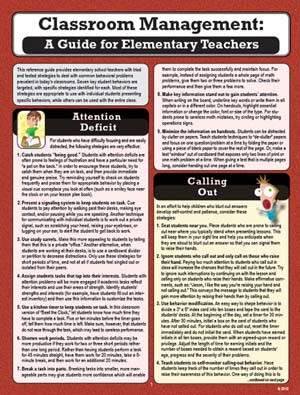Classroom Management to support Elementary Teachers
Establishing Classroom Climate
- Must first decide the look and feel of the classroom
- Ask yourself these questions when deciding what types of activities you will complete in your classroom
- Can you tolerate noise? Must the room always be quiet? Or can you put up with a mix of noise and quiet, depending on the learning activity?
- Must your classroom be neat (orderly rows, clean boards, limited clutter) or can you stand it messy?
- What do you want your desk and surroundings to say about you?
- How do you want students to turn in their work? Do you want them to put it into your hands, into baskets, or e-mail it to you? Let them know.
Tell students how you feel about classroom climate and how everyone can help maintain a pleasant, productive learning environment.
Conducting Class Efficiently
- Set long-term goals and keep them in mind as you do your daily planning.
- Quickly learn and use student names.
- Gain students' attention before beginning a new activity. Don't try to talk over student noise.
- Give students their next assignment before you collect or return papers.
- Be consistent in what you say and what you do.
Establishing Discipline
- Be consistent in what you say and what you do.
- Find an effective means of quieting students. Instead of saying "Shhh," consider using a subtle strategy such as dimming the lights, playing classical or other soothing music, or putting on the board a problem, a brainteaser, or an intriguing question relating to the lesson of the day.
- Avoid using threats to control the class. If you do use a threat, be prepared to carry it out.
- Nip behavior problems in the bud. Intervene quickly when students are behaving inappropriately.
- Whenever possible, reprimand a student one-on-one instead of across the room, in front of the whole class.
- Don't permit students to be inattentive to an educationally useful media presentation.
- Use appropriate punishment for classroom misbehavior.
Classroom Management tips for new teachers
Use a normal natural voice
Speak when students are quiet and ready
Use hand signals and and other nonverbal communication
Address behavior issues quickly and wisely
Always have a well-designed engaging lesson
